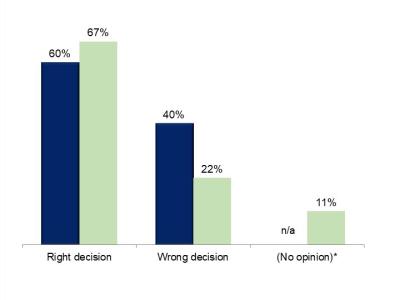Winnipeg, like other major Canadian cities, faces some serious social and economic challenges today. And when it comes to the state of downtown, how affordable it is to live here, how easy it is to get around and how safe Winnipeggers feel, anywhere from one-half to two-thirds of residents feel things have become worse over the past year. Relatively few believe things are trending in the right direction on these issues.
This new Probe Research survey for the Winnipeg Free Press finds:
- Two-thirds of Winnipeggers say it’s less affordable to buy or rent a place to live, and that the city is becoming less safe.
- Six in ten think downtown is getting worse (compared to three in ten who think things are staying the same and less than one in ten who think downtown is improving).
- About one-half think traffic in the city has worsened during the past year, with a similar proportion saying this about the overall condition of streets and roads.
What's more, Winnipeggers have little confidence that their elected municipal officials will make headway on solving these problems. Four in ten express some degree of optimism, but only three per cent are very optimistic that this will happen. Six in ten are pessimistic that Winnipeg Mayor Scott Gillingham and his council will fix these issues, including one in five who are very pessimistic.
Although confidence in the ability of the mayor and council to solve the city’s social and economic challenges is weak, these officials do enjoy modest approval ratings as they reach the midway point in their term.
- One-half (49%) approve of Mayor Gillingham’s job performance, compared to 35 per cent who disapprove and 16 per cent who are unsure.
- A slightly lower proportion (45%) approve of the job their local councillor is doing, with three in ten (31%) expressing disapproval. One-quarter of Winnipeggers are unable to provide a rating for their councillor. Residents who live in Winnipeg’s outer suburbs (52%) are more likely than those living in inner-city wards to be satisfied with the performance of their councillor.
The Story
With Mayor Gillingham and the rest of City Council approaching the midway point of their current term, they are earning average marks from Winnipeggers for their job performance. Citizens have relatively little confidence the mayor and council will be able to fix these problems. As the 2026 civic election approaches, one key question will be whether Winnipeggers expect more from the current group of municipal officials and hold them accountable if things continue to worsen, or if Winnipeggers place the blame on other levels of government.
About the Probe Research Omnibus
For more than two decades, Probe Research has undertaken quarterly omnibus surveys of random and representative samples of Manitoba adults. These scientific telephone surveys have provided strategic and proprietary insights to hundreds of public, private and not-for-profit clients on a range of social, cultural and public policy topics. The Probe Research Omnibus Survey is the province’s largest and most trusted general population survey.
Disclosure Statement
Probe Research is a member of the Canadian Research Insights Council (CRIC) and confirms that this research fully complies with all CRIC Standards including the CRIC Public Opinion Research Standards and Disclosure Requirements. Learn more at: https://www.canadianresearchinsightscouncil.ca/standards/por/
Methodology
Probe Research surveyed a random and representative sampling of 600 adults residing in Winnipeg between September 5th and 17th, 2024.
With a sample of 600, one can say with 95 percent certainty that the results are within ± 4.9 percentage points of what they would have been if the entire adult population of Winnipeg had been surveyed. The margin of error is higher within each of the survey’s population sub-groups.
The sample consists of 259 Winnipeggers randomly recruited via live-agent operator; 205 Winnipeggers randomly recruited via Interactive Voice Response (IVR) and 136 members of Probe Research's online panel. All respondents completed the survey on an online platform.
Modified random digit dialing, including both landline and wireless numbers, ensured all Winnipeg adults had an equal opportunity to participate in this Probe Research survey.
Minor statistical weighting has been applied to this sample to ensure that age, gender and regional characteristics properly reflect known attributes of the city’s population.




